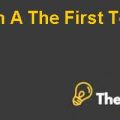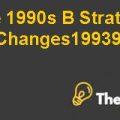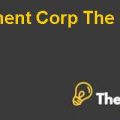
Yale University Investments Office
Introduction
The report presents a case about Yale University Investments, which was considerably been established in order to manage the operations of the university. Later on, the university’s investments office enjoyed tremendous success over the past few years and their returns continuously increased.
Yale adopted an unconventional approach to manage its endowments. Yale had made significant investments in less efficient equity markets such as private equity, real estate and absolute return investment rather than keeping its substantial share in domestic equity and shares. The university enjoyed tremendous returns from this conventional approach but the financial crises in 2008 tend the university to change its business model so as to cope with latest changes.
The university’s investments office was considering to allocate most of the university’s endowments to illiquid investments; private equity, real estate and hedge funds in order to appropriately respond to the current market changes. The report contains details of the strategies adopted by the managers to manage the domestic and international private equity investments. Further, it also includes the changes in the private equity market where on university shall not consider to allocate to private equity investments.
- 1. How has the Investment Office selected, compensated and controlled private equity fund managers? What explains the differences between their strategies in private equity with that in other asset classes (e.g., real estate)?
Managers are the core assets in the investments office because they were given considerable autonomy to invest in securities, which achieved immense returns and increased the worth of the organization. The managers were chosen carefully after a lengthy and critical analysis of their abilities, comparative advantages, performance records, and reputations. In addition, they were responsible for developing close and mutually beneficial relationships with other managers and to co-ordinate with each other so as to achieve remarkable results.
The university is more concerned about the compensation provided to managers because it is substantially affected due to the typical relationship between client and manager i.e; managers typically prospered where the assets under management grew large, this was not because they performed well for their clients, so investments office tried to build strong relationships and fee structures with their external managers to align the managers’ interests with Yale’s corporate objective.
External managers are controlled by the investment committee where day-to-day activities of the external managers are evaluated, selected and monitored. Basically, it was a mutual co-ordination between external managers and investments office and this relationship was established so as to achieve incredible results.
Further, external advisors also played a critical role in the entire policy making process where they were responsible for giving recommendations on both the investment policy and spending policy for the endowment. It mainly included how the money should be invested and how much of it could be spent in any given year. The Investments Office met regularly with the other financial departments in the university in order to co-ordinate overall liquidity needs.
In private equity market external investment advisers are given considerable authority to implement their strategies as they saw fit with relatively little interference from Yale. The Investments Office’s staff develops close and mutually beneficial relationships with external managers so as to co-ordinate effectively for making worthwhile investments. Further, the real estate portfolio of Yale was reviewed by their real estate managers and the university had exercised a wide range of control and continuously reviewd the investment decision of the real estate managers. Additionally, they had pared its portfolio to focus on those managers with whom the staff was most comfortable in terms of people and execution.
- 2. How has the Investment Office made international private equity investments? What explains the differences between the performance of their international and domestic private equity investments?
In order to facilitate effective investments, Yale adopted five principles. Firstly, the organization strongly believeed in equities, whether publicly traded or private. They considered that the equities area claim on a real stream of income as opposed to a contractual sequence of nominal cash flows.
The second principle was diversification; Yale believed that the risk could be more effectively reduced by limiting aggregate exposure to any single asset class, rather than by attempting to time markets. They believed that those views were usually reflected in market prices. Further, the investment team believed that emerging markets was a successful way of obtaining great returns because emerging markets presented tremendous opportunities due to both their greater inefficiencies and their dynamic as well as growing economies.
The third principle was to seek opportunities in less efficient markets. Over the past few years, Yale found that the difference in performance between U.S. fixed-income managers in the 25th and 75th percentiles was only 0.6% per year, and the comparable difference in performance for U.S. large-capitalization stock portfolio managers in the 25th and 75th percentiles was 4.5% per annum. This gap widened in less liquid assets:, which was 4.9% for hedge funds, 12.4% for venture capital, 16.0% for buyout funds, and 24.8% for real estate. This suggested that incremental ...................
This is just a sample partial case solution. Please place the order on the website to order your own originally done case solution.
Investment office at Yale University, was responsible for the management of its contribution, which amounted to almost $ 4 billion in June 1995. Yale University has developed a slightly different approach to the management of the fund, including a significant investment in a "less effective" stock markets, such as private equity funds, real estate, and "absolute return" investment. Investment Office is considering to devote more of its assets in these markets. "Hide
by Josh Lerner, Jay O. Light Source: Harvard Business School 26 pages. Publication Date: Dec 02, 1995. Prod. #: 296040-PDF-ENG













